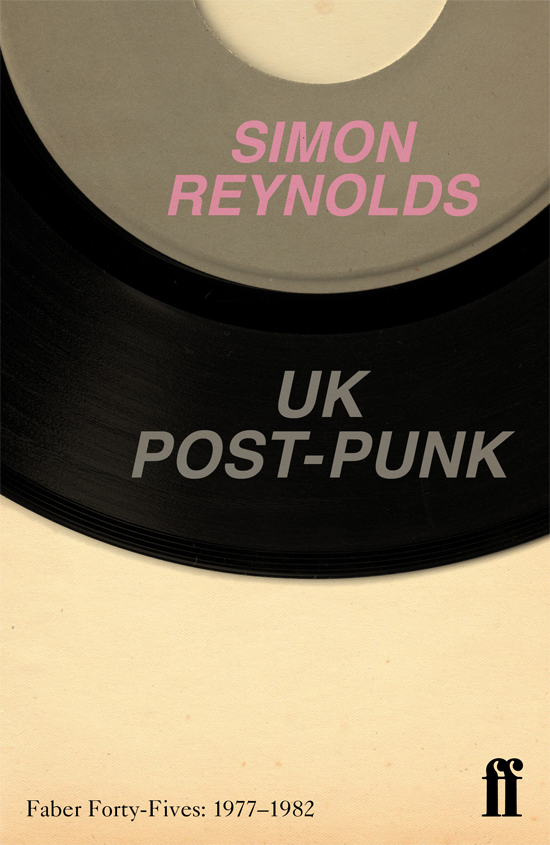As any fan of Faber’s brilliant music books by the likes of Simon Reynolds, Dorian Lynskey, Jon Savage, Richard King and so on well knows, they’re pretty enormous doorstep-type tomes, pages of excellent writing bound together into a series you could build a shelter from when the balloon goes up.
Today, with electronic reader fans and minimalists in mind, the publishers are launching a series of eBooks under the banner title Faber Forty-Fives. First up are six books, priced at a mere £1.99, and drawn from existing Faber titles like Reynolds’ Rip It Up And Start Again and Savage’s England’s Dreaming to "tell the story of British pop music" between the years 1966 and 1982. You can see full details of these releases below.
We’ve got a full set of the eBooks to give away to one lucky reader who can answer the following question, and email it to comps@thequietus.com, with Faber in the subject box. Closing date June 17th, T&C here. What is the name of Simon Reynolds’ book looking at the rise of UK dance music?
Rob Chapman: Syd Barrett and British Psychedelia
Faber Forty-Fives: 1966–1967
Syd Barrett and British Psychedelia is an intimate snapshot of the years 1966–7, when the underground’s house band, Pink Floyd, were cast blinking into the light of mainstream success. Nurtured in the progressive Cambridge scene and the bohemian hangouts of the Notting Hill Free School and UFO club, Pink Floyd pioneered a distinctly British mix of Victoriana, LSD-inflected mysticism, the avant-garde and pop. And at their heart was the gifted and complex songwriter, singer and guitarist Syd Barrett, who personified the psychedelic revolution in both its exoticism and its tragic impermanence.
Rob Young: Fairport Convention and Electric Folk
Faber Forty-Fives: 1967–1970
Fairport Convention and Electric Folk tells of the blossoming of British folk music in the late sixties, as rediscovered pastoral sensibilities aligned themselves with electric instrumentation. The album that spearheaded this gentle revival was Fairport Convention’s Liege and Lief – a bewitching mix of time-honoured standards and band originals, wove through with Sandy Denny’s haunting voice and Richard Thompson’s remarkable guitar playing. The scene that developed found its ideals in the bucolic and the communal, in Albion and its traditions, and included such influential bands and artists as Steeleye Span, John and Beverley Martyn, and Nick Drake.
Michael Bracewell, Roxy Music and Art-Rock Glamour
Faber Forty-Fives: 1969–1972
Roxy Music and Art-Rock Glamour is a detailed exploration of the origins of the glam scene in the early 70s. Fronted by the deeply charismatic Bryan Ferry – equal parts 50s crooner and stylish spaceman – and with the visionary Brian Eno on keyboards, Roxy Music melded high-art intentions with commercial savvy to redefine what we understand pop culture to mean, and in the course of so doing created some of the twentieth century’s most adventurous music
Nick Kent: The New Music Journalism
Faber Forty-Fives: 1973–1974
The New Music Journalism is legendary music journalist Nick Kent’s memoir of 1973 and 1974, two years that saw him go from aspiring, suburban scribe to celebrity journalist and companion to the likes of Led Zeppelin and the Rolling Stones. From hanging out with Lester Bangs in the States to dating Chrissie Hynde, Kent recalls an astonishing cast of 70s figures. But as his fame grew, so did his dependency upon narcotics, and these two years recount also the manic highs and strung-out lows such an appetite can bring.
Jon Savage: Sex Pistols and Punk
Kindle Singles: 1976
Sex Pistols and Punk recounts the turbulent months at the beginning of the British punk revolution in 1976. Starting as four disparate teenagers thrown together by Svengali Malcom McLaren to sell trousers, the Sex Pistols quickly became both prism and mirror for a disaffected youth eager to smash the old guard and make the world in their own, Warholian image. From dodgy backroom gigs to major-label overtures, Sex Pistols and Punk charts the dramatic rise of one of Britain’s most influential and controversial bands.
Simon Reynolds: UK Post-Punk
Kindle Singles: 1977–1982
UK Post-Punk is a selection of five essays that represents Simon Reynolds’ astute and thought-provoking commentary on the musical fallout of the punk explosion. Diversity is the watchword, with groups as stylistically varied as PiL, Joy Division and the Specials tackling the new musical terrain that had opened up. Often highly political – both overtly and through challenging the prevailing conservatism of the times – these groups were the soundtrack to the last days of socialism, national recession and the arrival of an aggressive new form of politics: Thatcherism.


